Zomato Bundle
Who Really Owns Zomato?
Understanding the Zomato SWOT Analysis is crucial, but have you ever wondered about the forces steering this food delivery giant? The Zomato company, a household name across India and beyond, has a fascinating ownership story. Knowing who owns Zomato is key to understanding its future trajectory and the strategic decisions that shape its path.
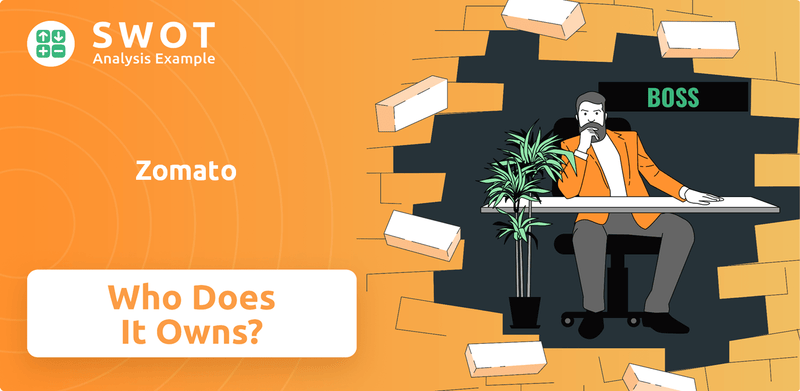
From its humble beginnings as FoodieBay to its current status as a publicly traded entity, Zomato's ownership structure has undergone a significant transformation. This evolution, marked by an IPO and the infusion of diverse Zomato investors, has reshaped the company's landscape. This exploration will unpack the details of Zomato ownership, revealing the key players, their influence, and the dynamics that drive this prominent player in the food tech industry. The question of "Who owns Zomato?" is more complex than you might think.
Who Founded Zomato?
The story of Zomato begins with its founders, Deepinder Goyal and Pankaj Chaddah. They launched the company, initially named FoodieBay, on July 10, 2008. Their initial focus was on building a restaurant-listing website.
In November 2009, both founders left their jobs at Bain & Company to dedicate themselves fully to the venture. This commitment led to the official incorporation of the company as DC Foodiebay Online Services Private Limited on January 18, 2010. The company was later rebranded to Zomato in November 2010.
During the early years, from 2008 to 2010, Deepinder Goyal and Pankaj Chaddah were the sole owners of Zomato. They concentrated on establishing a strong user base and expanding within the Indian market. This period was crucial for laying the groundwork for future growth.
Deepinder Goyal and Pankaj Chaddah started Zomato in 2008, initially as FoodieBay.
The founders left their jobs in 2009 to focus on the company full-time.
The company was officially incorporated in 2010 and rebranded to Zomato.
Deepinder Goyal and Pankaj Chaddah were the sole owners in the early stages.
Info Edge became a major shareholder in 2010.
Deepinder Goyal currently holds a significant stake in Zomato.
The Zomato company ownership structure evolved significantly from its founding. Info Edge's investment in 2010 was a pivotal moment, providing essential funding for growth. As of November 25, 2024, Deepinder Goyal's stake in Zomato is valued at over ₹10,000 crore, holding a 4.18% stake. Pankaj Chaddah, who left Zomato in 2018, held a 1.75% stake as of August 2020. For more details on Zomato's growth, consider reading about the Growth Strategy of Zomato.
- Deepinder Goyal and Pankaj Chaddah were the initial owners.
- Info Edge became a major shareholder in 2010.
- Deepinder Goyal holds a significant stake currently.
- Pankaj Chaddah's stake was present until his departure.
Zomato SWOT Analysis
- Complete SWOT Breakdown
- Fully Customizable
- Editable in Excel & Word
- Professional Formatting
- Investor-Ready Format
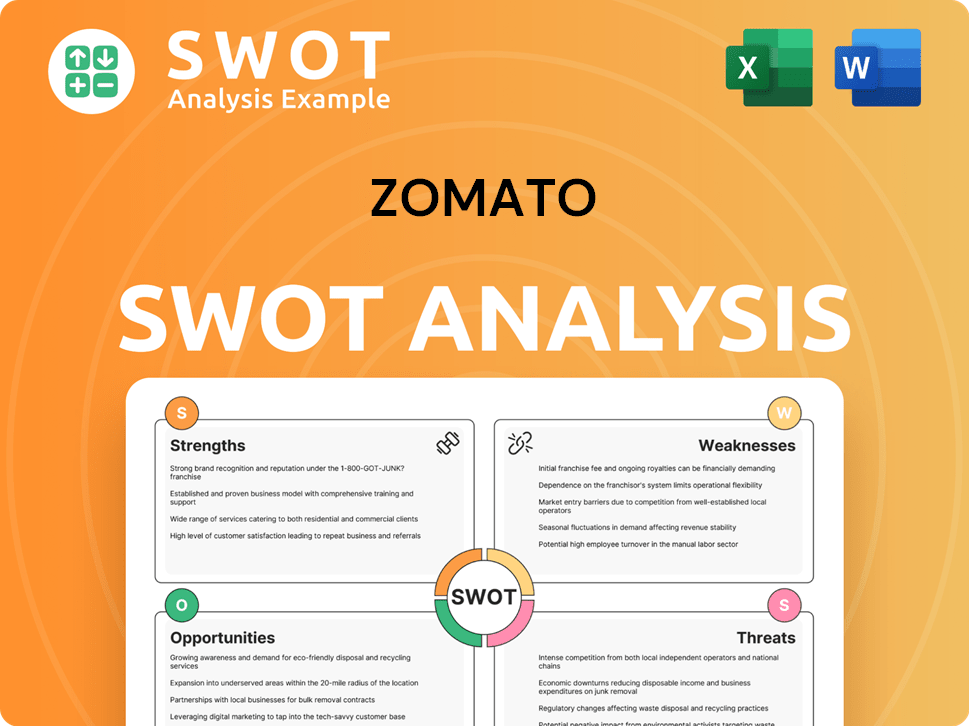
How Has Zomato’s Ownership Changed Over Time?
The ownership structure of the [Company Name] has evolved considerably since its inception. Early investments from Info Edge in 2010 and Sequoia Capital in 2013 were crucial in establishing its market presence. Further funding rounds supported acquisitions and platform development. A significant shift occurred in 2018 when Alibaba's Ant Financial became a major investor, providing substantial capital and expertise. The company's Initial Public Offering (IPO) in July 2021 marked a pivotal moment, transforming it into a publicly traded entity and diversifying its shareholder base.
The IPO in July 2021 raised approximately ₹9,375 crore (around $1.3 billion), leading to a diverse ownership structure. As of December 2024, Foreign Institutional Investors (FIIs) held 47.3% of the shares, while Domestic Institutional Investors (DIIs) held 16.42%. Public shareholders (Non-Institutional Investors) held 32.16%. Institutional investors collectively decreased their holdings from 69.87% to 67.85% in the December 2024 quarter. This shift from private funding to public trading has significantly impacted the company's strategy and governance.
| Milestone | Year | Impact on Ownership |
|---|---|---|
| Initial Funding from Info Edge | 2010 | Established early ownership and provided initial capital. |
| Sequoia Capital Investment | 2013 | Solidified market position and attracted further investment. |
| Ant Financial Investment | 2018 | Provided substantial capital and strategic expertise. |
| Initial Public Offering (IPO) | July 2021 | Diversified ownership and transitioned to a publicly traded company. |
The current major stakeholders in the [Company Name] include Deepinder Goyal, the founder and CEO, who held a 4.18% stake as of November 2024, valued at over ₹10,000 crore. Other significant shareholders are Info Edge (India) Ltd, Ant Group, Sequoia Capital, and Temasek Holdings. The evolution of the company's ownership, from early investments to a public listing, reflects its growth and strategic shifts. Understanding the Growth Strategy of Zomato also provides insights into how these ownership changes have influenced its path.
The ownership of the [Company Name] has transformed significantly over time, from early investors to a publicly listed company.
- Deepinder Goyal, the founder, remains a key stakeholder.
- Institutional investors hold a significant portion of the shares.
- The IPO in 2021 was a major turning point, diversifying the ownership base.
- Foreign Institutional Investors (FIIs) and Domestic Institutional Investors (DIIs) are key players.
Zomato PESTLE Analysis
- Covers All 6 PESTLE Categories
- No Research Needed – Save Hours of Work
- Built by Experts, Trusted by Consultants
- Instant Download, Ready to Use
- 100% Editable, Fully Customizable
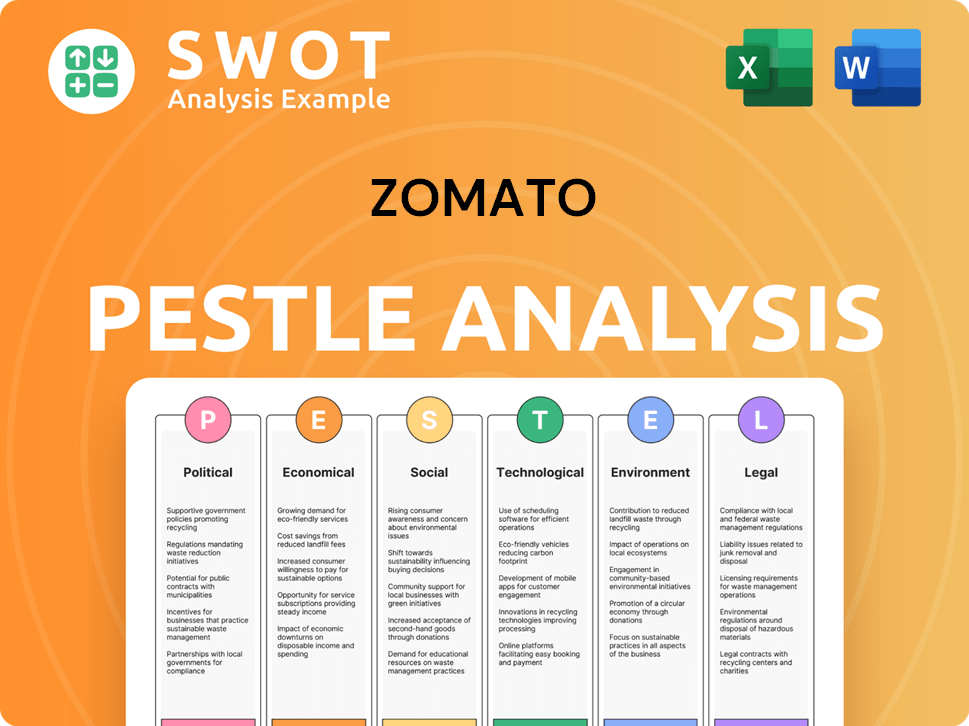
Who Sits on Zomato’s Board?
As of November 29, 2024, the board of directors for the Zomato company consists of six members. This includes one executive director, Deepinder Goyal, who is also the Founder, Managing Director & CEO. The board also has one non-executive nominee director, Sanjeev Bikhchandani, and four independent directors: Kaushik Dutta (Chairman), Sutapa Banerjee, Gunjan Tilak Raj Soni, and Aparna Popat Ved. The presence of three women among the independent directors highlights the company's commitment to diversity.
Aparna Popat Ved's appointment in 2024 as an independent director is focused on day-to-day operations and strategic implementation. The board's structure aligns with the Companies Act, 2013, and SEBI Listing Regulations, which mandate a minimum of three and a maximum of 15 directors. This structure ensures compliance and effective corporate governance within the Zomato company.
| Board Member | Role | Status |
|---|---|---|
| Kaushik Dutta | Chairman | Independent Director |
| Deepinder Goyal | Founder, Managing Director & CEO | Executive Director |
| Sanjeev Bikhchandani | Non-Executive Director | Non-Executive Director |
| Sutapa Banerjee | Independent Director | Independent Director |
| Gunjan Tilak Raj Soni | Independent Director | Independent Director |
| Aparna Popat Ved | Independent Director | Independent Director |
Zomato has a straightforward ownership structure, with each share carrying one vote. This one-share-one-vote system was in place at the time of its IPO. There is no indication of dual-class shares or special voting rights. In 2024, the company received shareholder approval for a new ESOP plan valued at $458 million. This plan, along with the existing Employee Stock Ownership Plan (ESOP), aligns employee interests with the company's success, which is a key aspect of the Zomato owner structure.
The current owner of Zomato includes a board of directors and major shareholders. Deepinder Goyal, the founder, is a key figure in the Zomato owner structure. The company's ownership structure is designed for transparency and fairness.
- The board includes independent directors ensuring governance.
- ESOP plans align employee interests with company performance.
- The company's history and ownership are important to understand the current structure. Check out the Brief History of Zomato.
- Zomato's ownership details are available through public filings.
Zomato Business Model Canvas
- Complete 9-Block Business Model Canvas
- Effortlessly Communicate Your Business Strategy
- Investor-Ready BMC Format
- 100% Editable and Customizable
- Clear and Structured Layout
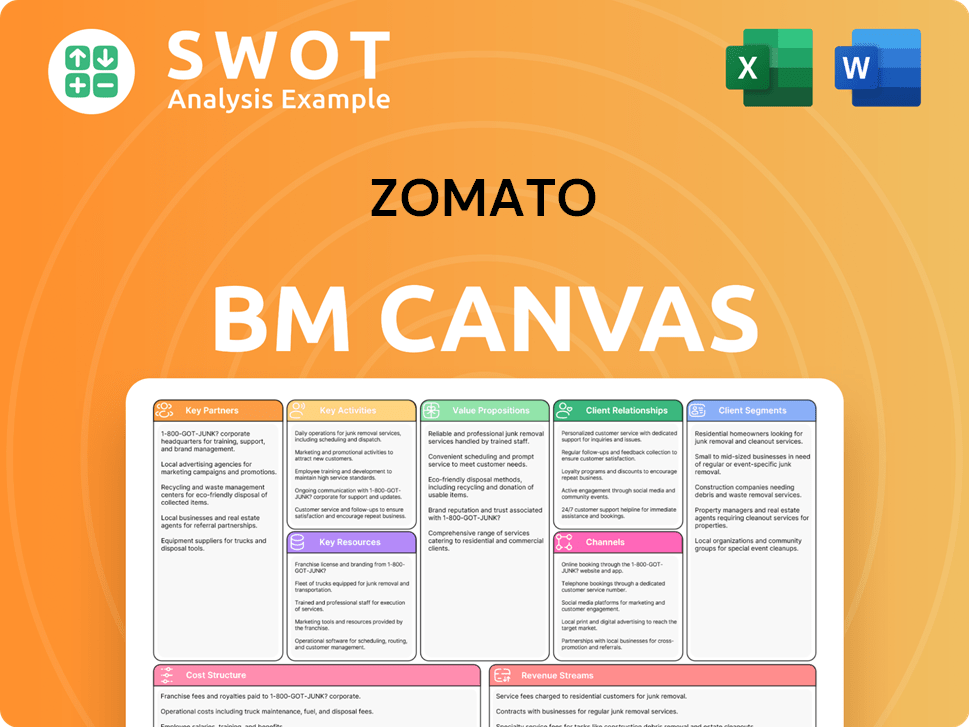
What Recent Changes Have Shaped Zomato’s Ownership Landscape?
Over the past few years, the ownership landscape of the Zomato company has seen notable shifts. A significant event was the successful Qualified Institutional Placement (QIP) in November 2024, which raised ₹8,500 crore (approximately $1 billion). This influx of capital, primarily from domestic mutual funds like ICICI Prudential and Motilal Oswal, aimed to strengthen Zomato's financial position and support the expansion of its food delivery and quick commerce (Blinkit) businesses. Motilal Oswal's investment of around ₹1,750 crore was the largest in this QIP.
Deepinder Goyal, the CEO and founder, has waived his annual salary of ₹3.5 crore from April 1, 2021, until March 31, 2026. Despite this, his stake in Zomato, amounting to 4.18%, was valued at over ₹10,000 crore as of November 2024. This valuation propelled him into the billionaire club by July 2024. Furthermore, Zomato's acquisition of Paytm's entertainment ticketing business for ₹20.5 billion (approximately $244 million) in August 2024 marked its entry into the live events and entertainment sector, positioning it to compete with players like BookMyShow.
| Ownership Category | Stake as of December 31, 2024 | Change in Holdings (December 2024 Quarter) |
|---|---|---|
| Foreign Institutional Investors (FIIs) | 48.02% | Decrease |
| Domestic Institutional Investors (DIIs) | 19.62% | Decrease |
| Retail Investors | 7% - 10% | Fluctuating |
The ownership structure of Zomato reflects a dynamic interplay between institutional investors, founder holdings, and retail participation. Institutional investors, including both FIIs and DIIs, collectively held 67.85% of the company as of December 31, 2024, though there was a slight decrease in their overall holdings during the December 2024 quarter. While Deepinder Goyal maintains a substantial stake, the overall pattern indicates a dilution of founder stakes as more investors have joined, particularly through the IPO and subsequent funding rounds. To understand the competitive environment, you can explore the Competitors Landscape of Zomato.
Major investors include institutional investors, such as mutual funds and foreign institutional investors, and the founder, Deepinder Goyal.
Deepinder Goyal, the founder, serves as the CEO and holds a significant ownership stake, valued at over ₹10,000 crore as of November 2024.
Zomato's ownership is diversified, with a mix of institutional investors, the founder, and retail investors.
Institutional investors collectively hold a significant portion, while Deepinder Goyal's stake is substantial.
Zomato Porter's Five Forces Analysis
- Covers All 5 Competitive Forces in Detail
- Structured for Consultants, Students, and Founders
- 100% Editable in Microsoft Word & Excel
- Instant Digital Download – Use Immediately
- Compatible with Mac & PC – Fully Unlocked
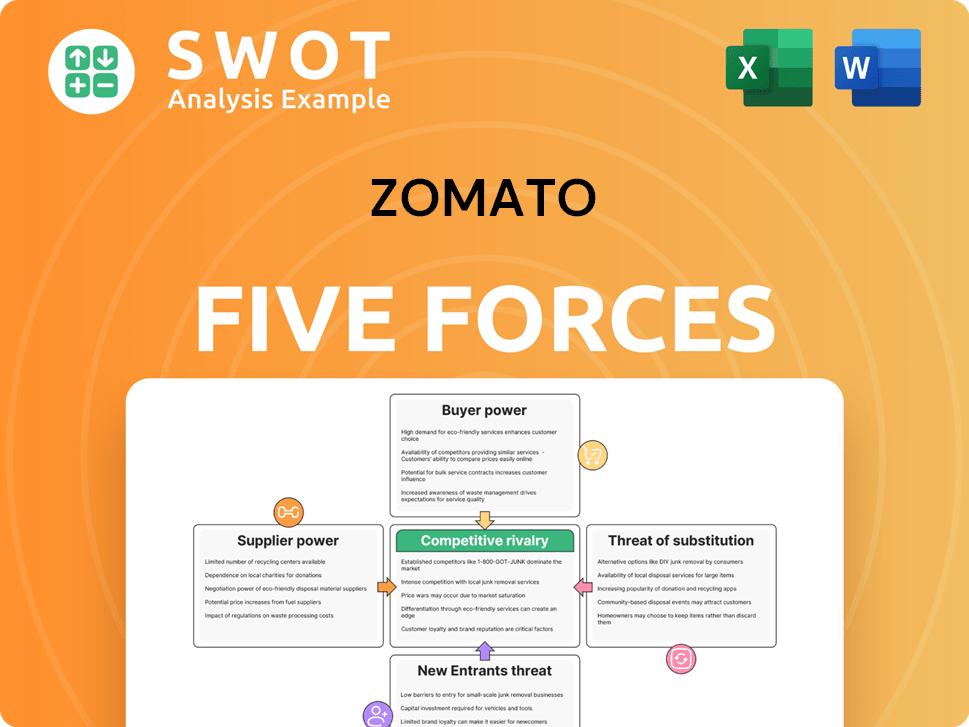
Related Blogs
- What are Mission Vision & Core Values of Zomato Company?
- What is Competitive Landscape of Zomato Company?
- What is Growth Strategy and Future Prospects of Zomato Company?
- How Does Zomato Company Work?
- What is Sales and Marketing Strategy of Zomato Company?
- What is Brief History of Zomato Company?
- What is Customer Demographics and Target Market of Zomato Company?
Disclaimer
All information, articles, and product details provided on this website are for general informational and educational purposes only. We do not claim any ownership over, nor do we intend to infringe upon, any trademarks, copyrights, logos, brand names, or other intellectual property mentioned or depicted on this site. Such intellectual property remains the property of its respective owners, and any references here are made solely for identification or informational purposes, without implying any affiliation, endorsement, or partnership.
We make no representations or warranties, express or implied, regarding the accuracy, completeness, or suitability of any content or products presented. Nothing on this website should be construed as legal, tax, investment, financial, medical, or other professional advice. In addition, no part of this site—including articles or product references—constitutes a solicitation, recommendation, endorsement, advertisement, or offer to buy or sell any securities, franchises, or other financial instruments, particularly in jurisdictions where such activity would be unlawful.
All content is of a general nature and may not address the specific circumstances of any individual or entity. It is not a substitute for professional advice or services. Any actions you take based on the information provided here are strictly at your own risk. You accept full responsibility for any decisions or outcomes arising from your use of this website and agree to release us from any liability in connection with your use of, or reliance upon, the content or products found herein.